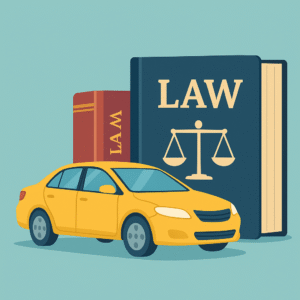
🚗 Introduction
The Lemon Law is a legal safeguard that protects consumers who purchase a defective vehicle that repeatedly fails to meet quality and performance standards
These laws exist at both the federal and state levels and aim to provide compensation, replacement, or refund to buyers who end up with a “lemon.”
In 2025, lemon laws are especially relevant due to rising car prices and more consumers purchasing electric and used vehicles. Understanding how these laws work helps you avoid major financial loss.
Last Updated: June 23, 2025
Author: Nahyan | UsLawGuide.net
⚖️ What Qualifies as a “Lemon”?
While lemon laws vary by state, most define a “lemon” as
- A new or used vehicle with a substantial defect affecting safety, value, or usability
- The defect occurs within a certain time or mileage limit (e.g., within 12 months or 12,000 miles)
- The dealer or manufacturer has made multiple unsuccessful repair attempts, usually 3–4 times
- Or, the vehicle has been out of service for 30+ days for repairs within the coverage period
Some states now include electric vehicles (EVs) and even motorcycles and RVs under lemon law coverage.
🛠️ State-by-State Lemon Law Examples (2025)
| State | Coverage Starts At | Repair Attempts | Days Out of Service |
|---|---|---|---|
| California | 18 months or 18,000 miles | 2–4 | 30 days |
| Florida | 24 months after delivery | 3 | 15+ days |
| Texas | 24,000 miles or 24 months | 4 | 30 days |
| New York | 18,000 miles or 2 years | 3 | 20 days |
| Illinois | 12 months or 12,000 miles | 4 | 30 days |
Each state requires the consumer to follow a formal complaint or arbitration process before litigation.
📝 Federal Lemon Law: Magnuson-Moss Warranty Act
This federal law offers broader consumer protection:
- Applies to any product with a written warranty, including used cars
- Covers defects not fixed within a reasonable number of attempts
- Lets consumers recover legal fees if they win in court
- Works alongside state lemon laws but doesn’t override them
🧭 Steps to Take If You Think You Bought a Lemon
- Document Everything: Keep repair invoices, service logs, and written complaints.
- Notify the Manufacturer: Most states require written notification.
- Request Final Repair Attempt: Some laws allow the manufacturer one last chance.
- Begin Arbitration or File a Complaint: File with your state’s consumer protection agency.
- Consider Legal Action: If unresolved, consult an attorney who specializes in lemon law.
❓ FAQ Section
Q: Do lemon laws apply to used cars?
➡ In many states, yes—especially if the vehicle is still under warranty. Check your local lemon law.
Q: Are leased vehicles covered under lemon law?
➡ Yes, in most states, leased vehicles are covered under the same protections.
Q: Who pays legal fees in lemon law cases?
➡ If you win, the manufacturer typically pays attorney fees under the Magnuson-Moss Act.
⚠️ Disclaimer
This article is for informational purposes only and not legal advice. Lemon laws vary by state and case. Always consult a lemon law attorney or your state’s consumer protection agency.
🔗 Internal & External Links
External:
Internal (uslawguide.net):